Ruth Ann Nordin's Blog, page 20
October 3, 2021
The Audiobook Thing
 ID 217844253 © Jaiz Anuar Yeop Johari | Dreamstime.comThe backstory…
ID 217844253 © Jaiz Anuar Yeop Johari | Dreamstime.comThe backstory…Remember a year ago when I said I was going to work on my own audiobooks because it was so much fun? I didn’t give up on the idea, though I did take a break. To be honest, I got discouraged after listening to the recording of Meant To Be, which was my first attempt at it. I don’t know if it was the microphone or my voice or my editing, but at the time, I wasn’t happy with the results. Because of that, I walked away from the whole idea.
Fast forward to last month when I realized my oldest son (who is now 19) was interested in voice acting for audiobooks. I decided to give a short story a try, and it turns out he really brings out the emotions and does a good job with different voices. He’s better than I am. His voice seems to have more range to it than mine does. But I love reading my books, and it doesn’t cost me anything to create my own audiobooks, so I figured why not give this thing another go? I can’t guarantee a professional quality experience. All I can promise is that I’ll do my best with the voice God’s given me.
What this all means for today:Before Craig and I started a full-length book, I thought it would be best to start with short stories. Since October is the month for spooky stories and I happen to have some on hand, those are the first stories we’ll be posting. I created a Rumble and Bitchute channel to upload the audiobooks to, and I dusted off my old You Tube channel to post them there. I don’t believe in only having stuff in one place with my ebooks, and I feel the same way with audiobooks.
This is a labor of love. I’m doing it for the enjoyment factor. To protect myself from pirates, however, I will be uploading them to Findaway Voices to distribute to retailers. I wasn’t originally planning to do that, but then I thought of how easy it would be for someone to download the audio files, slap on a crappy cover, and pretend they have the rights to publish my audiobooks. It’s a sad world when you have to take the extra step to protect your work, but after going through takedown notices to different retailers over the years, I learned it’s best to get the book up before the thief does.
The romances I narrate with my son are going to be PG-PG13. Long story short, going over a sex scene with mom is just “gross”. You can’t blame the kid. He wants to believe the stork delivered him.  Anyway, I do have romances where I can remove the spicier content. For example, in Regency, Breaking the Rules, Nobody’s Fool, and A Deceptive Wager can be easily made into PG-PG 13 books. In historical western romance, Nelly’s Mail Order Husband, Perfectly Matched, and Suitable for Marriage are other books I can do at that rating.
Anyway, I do have romances where I can remove the spicier content. For example, in Regency, Breaking the Rules, Nobody’s Fool, and A Deceptive Wager can be easily made into PG-PG 13 books. In historical western romance, Nelly’s Mail Order Husband, Perfectly Matched, and Suitable for Marriage are other books I can do at that rating.
There are some books, however, that I just can’t do that with. I’ll have to narrate the romances that require those scenes. Books that come to mind as I type this are His Reluctant Lady, The Earl’s Scandalous Wife, and A Perilous Marriage in the Regencies. For historical westerns, they include The Fugitive’s Bride, The Bargain Mail Order Bride, Boaz’s Wager, and Wagon Trail Bride. Just so everyone knows, if I’m the only narrator of the audiobook, I will remove the sex scenes when I upload the books to Rumble, Bitchute, and You Tube. I don’t want to run the risk of a kid stumbling upon it. I know those sites have settings to protect the kids, but what if a kid gets on their parent’s computer? I don’t want to take that kind of risk. The R rated version will only show up at the retailers Findaway Voices distributes to. If my son narrates the book with me, I’ll use the PG version because I don’t have time to redo a book all on my own. Maybe someday I will, but I won’t any time soon.
I already taught my son how to edit the audio files in GarageBand. His hearing is better than mine, so he picks up on things I miss. Editing audio files is easy, but it’s time consuming. I figure he can take that load off of my shoulders so I can be freed up keep writing.
How often and when?The short stories are easy to do as one file on Rumble, Bitchute, and You Tube. Romances, however, are going to be a bit more challenging, so I decided I’ll post those one chapter at a time. I haven’t decided yet how often to make a new post. My aim is to get one romance uploaded a month once we hit November. At the moment, I’m narrating The Outlaw’s Bride myself. Craig and I will start on Nobody’s Fool within a couple of weeks. For November, I’ll upload Meant To Be since that is already done.
I will not be putting any audiobooks on Amazon/Audible.Sorry but I can’t tolerate ACX’s policies of letting people treat Audible like a library. I’m not sure how many people who use ACX are aware of it or not, but every time someone returns an audiobook (even if they finished the whole thing), ACX turns around and deducts that money from the author’s future royalties. So let’s say someone purchased Loving Eliza in June, listened to it, and returned it in July. I would get paid for the sale of Loving Eliza for June. But then in July, I would pay that money back to ACX. So ACX never loses any money, and the person got to read my audiobook for free. Meanwhile, I paid the narrator per hour for that book, so I’m out the money. This is basically robbing the author, and I blame ACX for it since they make it sound like the author still gets paid when they send their emails encouraging people to return audiobooks.
There are legitimate libraries and subscription services for people on a budget. Plus, I am uploading these to Rumble, Bitchute, and You Tube where people can listen to these for free. At least with these avenues, I don’t get a payment only to have my future royalties deducted. I feel that what ACX does to authors (and narrators who aren’t paid upfront) is underhanded. It just rubs me the wrong way. And for any pirates who might be reading this, I already claimed my books over there to avoid theft.
I already signed a contract with a narrator to have Eye of the Beholder and the books in the Virginia Series on ACX. But I’m not putting any other book up there.
Findaway Voice treats authors well, which is why I’ll go with them to distribute audiobooks across the other retailers and libraries out there.
September 27, 2021
Sometimes It Feels Like You’ll Never Finish That Book (A Post for Writers)
This is my current mood, and if any of you have had to push back writing your book for other things that keep popping up, you know the feeling.
 ID 42425850 © Yorgy67 | Dreamstime.com
ID 42425850 © Yorgy67 | Dreamstime.comI don’t know what is worse: burnout or being unable to write even though you have the desire to do it. Each has its obstacles. The thing is, in burnout, you’re relieved when some unexpected thing pops up because it gives you a valid reason not to write. When you want to write (and have the ideas coming), it’s extremely frustrating when things get in the way.
The woes of being a writer who is bombarded with things one can’t control…Some things that come up can’t be avoided. No matter how much you try to abide by a routine, some wrench is going to find its way into your plans. It’s called life, and while I know this can’t be avoided, it makes me want to pull my hair out and scream. I’m sure others have felt the same way. Maybe you’re currently going through this, too.
What people often miss is that writers NEED to write. If we don’t write, the book never gets done. In order to write, we need time. It’s best if that time is free of stress and free of distractions, but in the real world, it often doesn’t work out that way. Anyone with a sick parent, financial problems, school-aged children, or health issues know this. Sadly, most people in a writer’s life don’t understand how important uninterrupted writing time is. I don’t know how often I’ve told my family I need to write, only for someone to come into my room to tell me about something they saw on TV that is of little consequence to anyone. They just don’t get it. Most non-writers don’t get it. Since you’re sitting at home on a computer, people just figure you’re goofing off. And people outside the home figure since you don’t have a “real job”, it’s not a big deal to ask you to drop everything to take care of something.
So what does a writer to do? You can’t make people understand what you do requires time and work. You can’t prevent unexpected things from creeping into your life. But there are some things we can still control. The last thing we want to do is add to our stress by letting this feeling of frustration take over. Like this weekend and this morning when two things popped up, I found that my frustration was taking over my ability to know what to write next. I was letting stress take control of the situation. We do our best writing when we don’t let stress take the wheel.
Here are my tips to overcome the woes so we don’t let them get the best of us and ruin our ability to write:(If you have any you’d like to share, I’d love to hear them. The more ideas we have, the better.)
Take a deep breath and regain your equilibrium.
I’m here writing this post to make myself do this. Sometimes just sharing the frustrations is enough to offset the stress. If I wasn’t writing this post, I’d take a walk. But you can do anything so long as it relaxes you. Whatever helps to take your mind off of the source of stress, do it until your head clears, and your muscles relax.
In cases of distractions, I’ve learned it’s pointless to remind people that writing is a “real job”, so if the distractions get to be too frequent, I’ll either drive to the park and write, dictate into a phone, or I’ll give up for the day and work on the non-writing tasks of the job instead since those are easier to bounce back to after being interrupted. If you can’t go away or do something else, write in 10 to 15 minute sprints. I had to do this when all of my kids were too young for school.
Focus on a small goal.
Instead of thinking, “I need to write 1,000+ words today,” try for a smaller goal. I like to go in 250-word increments because it’s not as daunting, especially when I’m overwhelmed. A little done that day is better than nothing. If you don’t think in terms of word counts, you can use time. Say you usually set an hour to write. Instead of making an hour be the goal, aim for 15 minutes.
I’ve found that if I can tackle one or two rounds of the small goals, it gets easier to write, and I end up with a decent word count for the day. For example, my word count goal used to be 3,000 words for the day. Ever since this summer when everything got turned upside down, I lowered that goal to 1,500 words. Then I pushed back my release dates. Sometimes you have to cut things in half in order to remain steady.
Slow down.
It’s far more important that you can still do something, even if it’s at a slower pace, than to work yourself to the point of burnout because you pushed yourself too hard. There are a lot of books out there. I know it’s scary to think your readers might forget you exist. We have email lists, social media, and blogging to announce when we have a new book, but in the back of our mind, there might be that doubt that the reader will even be excited about the new book if we take too long to get it out there.
Our instant gratification culture of binge watching stuff and (now) binge reading has made this a very real threat to some of us. (I know it worries me that my readers will get bored of waiting and drop me.) But I remind myself that the quality of the book must be more important than how long it takes to get the book out. If I can’t give a book my best, then it’s better off not going out in the world. I’ve rewritten several books in the past, so I say this from experience.
Avoid comparing yourself to other authors.
This is a hard one. I had to drop out of some author groups and walk away from some YouTube channels and podcasts from superstars in the indie writing community because listening to them talk about how frequently they got books out, how they were making a bazillion-gillion dollars a year, and how they excelled at marketing made me feel like crap. Some might have found the examples inspiring and helpful, but quite frankly, I didn’t. All it did was make me wonder, “What am I doing wrong?” I know that is not a popular thing to say, but it’s the truth, and I see no point in lying. This writing gig is harder than it looks.
But you know, maybe those authors don’t have a spouse and kids to take care of. Maybe they have more discretionary time than someone who needs an outside job to help pay the bills. Maybe there are no aging parents that need help. Maybe they’re in the prime of their health. Or, maybe, they are sacrificing time with their family to write, which is easy to do if you’re not careful. Maybe they’re writing books that they don’t really like but are fitting into the market, and deep down, they’re not happy with the process of writing. It’s easy to make money the number one goal. It’s easy to sacrifice a lot of things (like God, family, friends, health) for the sake of getting more books written at a faster pace. We never see into their personal lives. We only see the smiles and the sales’ reports. Who knows if they’re not crying when no one is looking. I did a lot of crying when I made $200K a year because the pursuit of money had taken the place of enjoying the writing. I make less now, but I’m happy. Money isn’t everything. Those sales aren’t everything.
So really, the best thing we can do is focus on things we have direct control over and make the most of them.
Write what you love.
If you love what you’re doing, writing is still work. It’ll feel like play at times, but it still takes commitment to finish a book. There will be days when you won’t feel like doing it. However, if you love what you’re working on, it helps a lot in being able to push through the “eh” days you’re going to face.
I’m currently reading The Relaxed Author by Joanna Penn and Mark Leslie Lefebvre, and one interesting thing I picked up so far was this point on why passion matters so much: think of what you want to read. As the author, you will be going over your books to edit them. You have to go through and read that first draft. Imagine how miserable it would be to have to read through and edit a book you didn’t care about? Even if you wrote it, that would end up being a chore if you were doing this for years. At least when you enjoy the story, the process of rereading and editing is a lot easier to manage. Plus, years from now, you’ll want to go back and read your own work.
If you can look forward to what you’re doing, the stress and frustrations of the unexpected stuff that comes up in your life, then writing offers you something you can anticipate. For me, the writing is a reward after dealing with all the other things that aren’t so pleasant.
Talk to other authors or write a blog post.
Both work great for me, and this blog post has been very therapeutic. Sometimes you have to talk or write out your frustrations in order to ease the stress. No one understands the frustration of not being able to write more than another writer. It does no good to hold it in.
Now I’m relaxed enough to write.  Hopefully, my tips will help someone out there.
Hopefully, my tips will help someone out there.
***
September 25, 2021
Interview for a Wife is Available!

This completes the Nebraska Prairie Series.



A quick reminder, The Purchased Bride was in the Bride by Arrangement anthology, and The Bride’s Choice was in the A Groom’s Promise anthology. (I’ll post the covers of the anthologies in case you already have these. If you do have them, you already have the first two books in the Nebraska Prairie Series.)
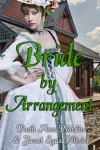
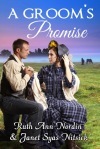
Interview for a Wife is a brand new story that I have not published before.
About Interview for a Wife
Interview for a Wife is pretty much Eye of the Beholder meets Bid for a Bride. The central theme is overcoming insecurities, and it’s the love the hero and heroine have that enables them to do it.
Here is the description:
When her husband died, Deanne Grayson didn’t shed a tear. She did, however, worry that his death meant she’d have to return to her hometown in Kentucky. Fortunately, she stumbles upon an ad in the paper from a man in Lincoln, Nebraska who is interviewing for a wife.
Widower Bill Harvey is in need of a wife to help him run his general store. Plus, it would be nice to have help raising his two young children. But being confined to a wheelchair doesn’t exactly make him confident when it comes to a more intimate union with a woman. So when Deanne comes in for an interview, he makes a stipulation. He’ll marry her, but they won’t be consummating the marriage.
A marriage of convenience suits Deanne just fine. She’s not looking for love. As long as she doesn’t have to return to her hometown, she’ll be happy.
It’s not long before Bill starts to have desires he put behind him after the accident that confined him to a wheelchair. Yes, it was his decision to treat their marriage like a partnership, but after he gets to know her, he starts to want more. Exactly how can he, someone who is only half a man, expect her to want a real marriage with him?
If this sounds like a book you’d like to read, here is where you can find it:
September 22, 2021
Updates on What I’m Doing
I notice WordPress made some changes in how I can pin pictures in my blog posts. I’m not thrilled with it, but if the placement of the covers suck or are too big, that’s why.
Interview for a Wife will be out this Saturday.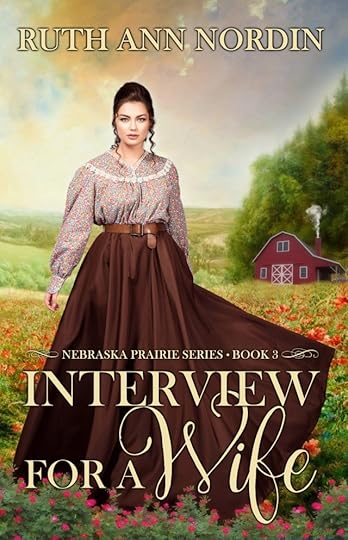
And I’ve been trying to line things up so that the blog post, Mailchimp newsletter, update this blog and my website, and other small things here and there I do when I put a new book out. At one time, I made a list, but I don’t know where I put it. I hope I don’t forget to do anything. I know. One would think by now I’d have it all memorized, but I don’t. 
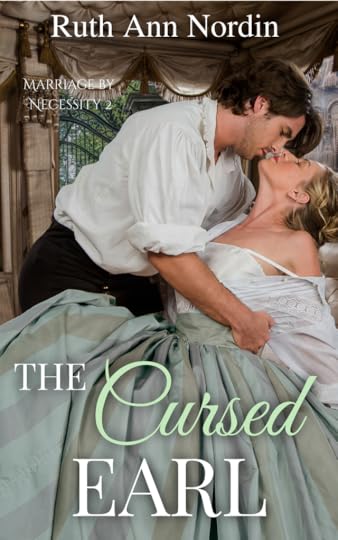
Books in the Marriage by Necessity Series:



After all this time, the end is in sight. This book has been so tricky. I know who the villain is, but figuring out HOW the villain will make his move has set me on one dead end after another because I need the other characters to fall for what he’s doing in a way that makes sense. I can’t say what the villain is going to do or why without spoiling the book. Suffice it to say that someone doesn’t want our hero and heroine to have a happy ending.
The Loner’s Bride is over halfway done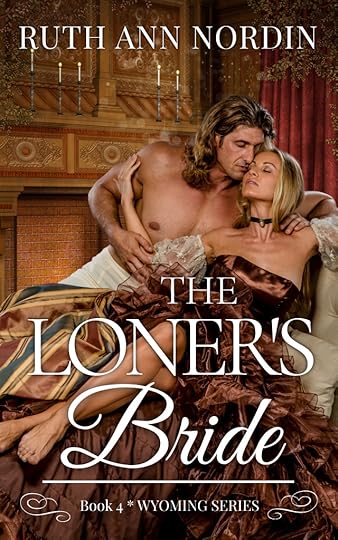
Books in the Wyoming Series:




I’m at the point where Katie has just confronted Jeremiah on taking his time in acknowledging his feelings for her. If you remember Katie in The Rancher’s Bride, you know she says exactly what’s on her mind. I’m not sure how Jeremiah is going to react yet. I have to write that part of the scene tomorrow. 
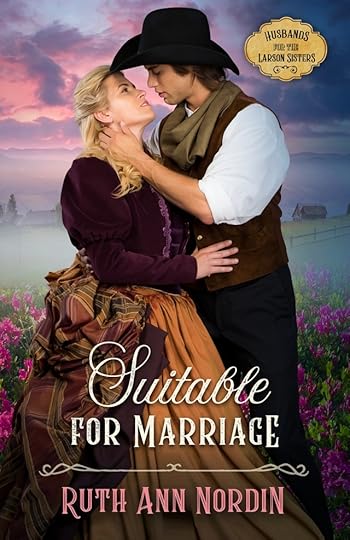
Books in the Husbands for the Larson Sisters Series (Book 4 to be added):
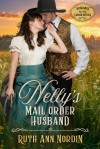
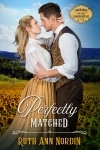

Daisy Larson (the youngest of Tom and Jessica’s daughters) set a trap that forced Alex and Erin to marry. I didn’t expect her to do that when I started this book. I knew Alex and Erin would end up together, but I had no idea how. Now I know. But, there’s more to go before I’m ready to end the story. Neither Alex nor Erin are sure what to do. Their parents are very happy with the match because they’re friends and had hoped to see Alex and Erin together. Erin had other ideas, but she ended up with him anyway because this is a romance and I have a weird sense of humor.  So at the moment, they’re standing in a house wondering what to do since it’s their wedding night and the only reason they married was because Daisy was being sneaky. Tomorrow when I continue the scene, I’ll find out what happens. I have a suspicion, but until I’m writing, it’s hard to really know.
So at the moment, they’re standing in a house wondering what to do since it’s their wedding night and the only reason they married was because Daisy was being sneaky. Tomorrow when I continue the scene, I’ll find out what happens. I have a suspicion, but until I’m writing, it’s hard to really know.
***
That’s about it. It feels good to finally be back on track and in my writing routine again. I get cranky when I don’t write, so you can imagine my family’s relief. 
September 14, 2021
Sometimes My Psychology Background Pops Up in My Stories (And Then Inspires Me To Write Blog Posts Like This One)
 ID 178730443 © Umer Abdul Ghaffar | Dreamstime.com
ID 178730443 © Umer Abdul Ghaffar | Dreamstime.comToday while I was writing a scene in The Cursed Earl, I wrote this:
He thought over what she said. Maybe if he made one small decision to act in hope, then some of his fear would lessen. And if it lessened, then he might be able to make another small decision that would take him another step in the direction he wanted to be. Over time, he might be able to overcome his fears completely.
As I wrote that, I thought back to my college days in my Psychology courses. Any time someone has a behavior or feeling they want to change, the key is to go in small steps. The reason for this is that behaviors and feelings are deeply embedded in us. A lot of times, we do, think, and feel things on a gut level. The longer we’ve held onto these things, the harder it is to overcome them. This is why you can’t expect permanent change overnight.
For example, if a person is afraid of snakes, they have to start out in a safe environment where they simply think of snakes. This way, they still have some control over their environment while confronting something that scares them. Once the person can comfortably think of snake, then the person is ready for the next step. This can be seeing pictures of snakes. Once the person is comfortable with that, they might watch videos of snakes. The eventual goal is for the person to hold a snake without being afraid of it. The reason this is a successful way of conquering the person’s fear is that the person isn’t forced to hold a snake right away. There were a series of intentional, small steps that built up to the final point.
This approach to changing feelings and behavior was often discussed in my classes, and it works great. Any time I’ve needed to make a significant change in my life, I’ve applied this strategy with success.
An example from my real life is health. I knew I had to cut out a lot of unhealthy habits from my life, but there were so many that I couldn’t do them all at once. (I tried, and that only lasted for a couple of weeks. The overhaul was just too abrupt. I needed to allow time to adapt new habits.) So, recalling the snake example I’d heard about in college, I went with the small-step approach. I started with cutting those coffee shop sweet drinks from my diet. Once I stopped craving those drinks, I moved to candy. (Chocolate, by the way, took forever to get over.) Then, when I conquered those cravings, I moved to processed foods. This was a big list, so I went with individual foods instead of removing all of the processed stuff from my diet at once. I’m still working on this one. It’s been about a year since I started this journey, and I’m almost where I want to be.
The more you need to change, the longer it’s going to take.
This technique also goes for learning something new.
Take writing, for instance. When I started writing historicals, I knew very little about the historical time period I was writing about, which plenty of people were quick to point out. It wasn’t that I didn’t know I was lacking in this area. It’s just that the information was so overwhelming that I had trouble knowing where to begin. People told me to stick with contemporaries, but my heart was in the historicals. I made the decision that I would focus on one or two main aspects of historical US western life when I got started. So when I wrote Eye of the Beholder, I researched sod homes and how horses give birth. After I finished that book, I felt a lot more comfortable in that “world”. Then I wrote Meant To Be, and in that one, I worked on “feeling” like I was in the Old West because up to then, it wasn’t easy to transport myself there in my mind, no matter how many movies and TV shows I watched. For every book I’ve written since then, this is what I keep doing. I take one main area I need to fine tune and make that my goal for the book I write. This is a continual process. I don’t think I’ll ever stop learning on this one.
Sometimes it’s the journey itself that’s the reward. I think sometimes we’re apt to give up on something we really want because we don’t get the results we’re looking for right away. This is a huge mistake.
Focus on the small steps. As long as you’re heading in the direction you want to go, that’s all that matters. For every book I write, I know I improved. Also, when I look back on my eating and exercise habits over the year, I can see improvement there, too. Sometimes we don’t get to the final result right away. Sometimes it takes months. Sometimes it takes years. Sometimes it’s a lifelong process. As long as you’re going in the direction of your goal, that’s what counts.
And since there is always a critic out there, I feel the need to address this while I’m writing this post. There will always be someone who criticizes what you’re doing, why you’re doing it, or how you’re doing it. I don’t know why these people do this. Maybe they’re meant to test our resolve. I still have people to this day telling me I should quit writing for one reason or another, and I’ve been publishing ebooks since 2009. The critic never truly goes away. They’re different people with different things to say, but sure as the sun comes up every morning, they are always there. You just have to keep in mind that you’re living your life. They are not allowed to live your life for you. If they don’t like what you’re doing, that’s their problem. You can’t change how they think or feel. At the end of your life, you want to look back and be glad you made the choices you did. I’ve been around people who had regrets, and it is painful to watch them as they go through a list of things they wished they had done but didn’t.
On a final note:
This approach of taking small steps to reaching your goal only works for things you can control. You can’t make anyone else do the things you want to accomplish. For example, authors often ask, “How do I sell more books?” No one can truly help you in this regard. You can write more books, you can write better books, you can package your books so they’re more attractive, you can get on social media, you can run ads, and you can create a blog/website, but you can NOT make someone buy your book. You also can’t make them read the book, like it, and tell others about it. I mean, you can ask them to, but you can’t force it. Another person’s desire to buy your book and whether or not they enjoy it are all out of your control because you are not this other person. You can only control you. So when you come up with goals that you want to take small steps to achieve, be sure you’re picking the right ones.
September 11, 2021
D2D is My “Go To” Place for Making Paperbacks
I used to use CreateSpace, which was an arm of Amazon, to make paperbacks. CreateSpace was a nice platform to work with. Then Amazon decided to shift all books in CreateSpace to Kindle Direct Publishing (KDP). Up to then, KDP was just for publishing ebooks.
In my opinion, KDP as a paperback publishing platform sucks. It’s difficult to get to the cover dimensions just right. I lost count of the hours I wasted in vain on that one. And I wasn’t the only one who had problems. Two of my cover artists struggled with getting the full paperback cover to accept their pdf files, too. One cover artist was able to do it on the first try. But the problem is, I like being able to do this stuff on my own as much as possible in case something happens to a cover artist and I need to take care of things myself.
I finally settled on their template where I uploaded my ebook cover for the front cover and then going with a plain background for the spine and back of the book.
Here’s an example of what I’m talking about:
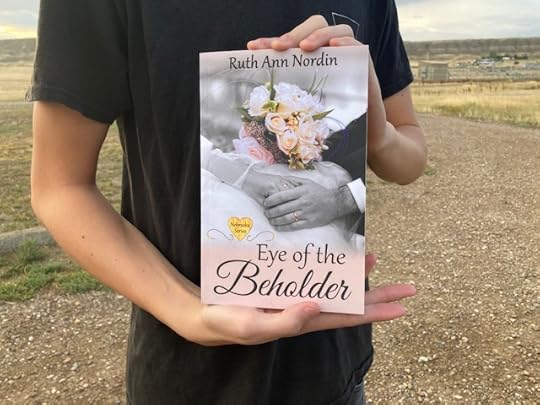
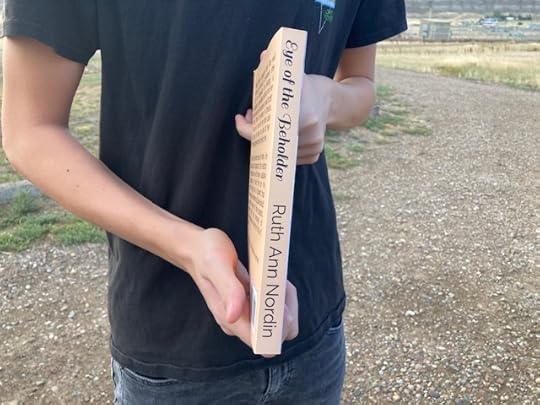
 Note the plain spine and back cover. This is the best I can do with KDP.
Note the plain spine and back cover. This is the best I can do with KDP.At least Eye of the Beholder came out looking good on the front cover. About half the time, the cover was a bit “off” when it went to print. Note the black lines on the edges of these two covers.

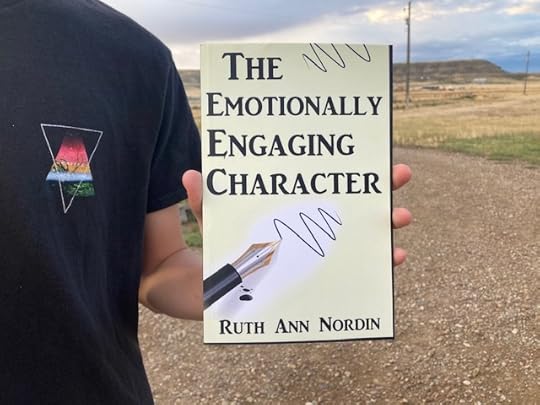 Note the black lines across the top and bottom of 11 Tips for New Writers, and note the black lines on the right side and bottom of The Emotionally Engaging Character. (These black lines are NOT supposed to be there.)
Note the black lines across the top and bottom of 11 Tips for New Writers, and note the black lines on the right side and bottom of The Emotionally Engaging Character. (These black lines are NOT supposed to be there.)I did not put those lines in myself. My spine and back covers on those books are black, but the front cover background is supposed to be yellow all the way to the edges. There is something in their printer that doesn’t make the final product “off” at some edge somewhere. Like I said, this happened half the time to me. I know I could return the books and get them reprinted, but I have better things to do with my time than get into another fight with Amazon. (I have enough on my plate with dragging out my Copyright Registration letters every time they have a fit over one of my books.)
So anyway…
I decided to give Draft2Digital (D2D) a try with their paperbacks.
At this point, I’m going to give a shout out to Book Brush. Book Brush is what I use to make ebooks and paperbacks. I used to use GIMP, but Book Brush is a lot easier. I do the bulk of the work in Book Brush. Once in a while, I use GIMP to add something (like swirly lines) to the cover.
I successfully created two paperbacks I’m happy with using D2D.
A Deceptive Wager paperback

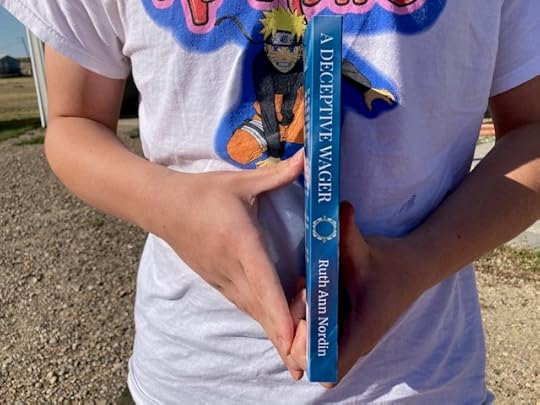
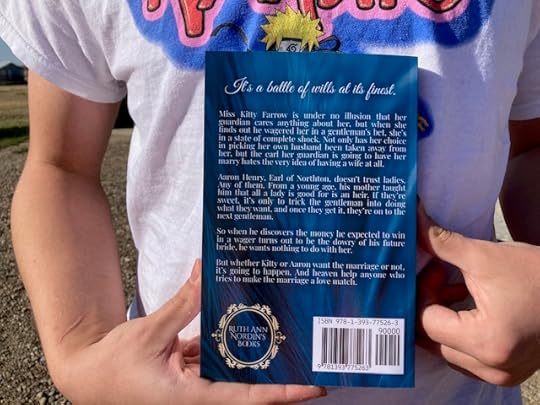 Note there are no unwanted lines across the top of the front cover, and I can create a much better spine and back cover. While it’s nothing fancy, it adds more of a professional look to the overall cover.
Note there are no unwanted lines across the top of the front cover, and I can create a much better spine and back cover. While it’s nothing fancy, it adds more of a professional look to the overall cover.A Perilous Marriage paperback

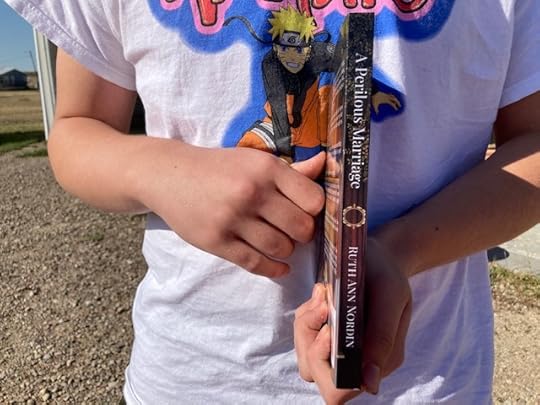
 Again, no unwanted lines on the front cover, spine allows for some decorative “extras” and the back allows for two different images along with the text. This is fancier than A Deceptive Wager, but I was experimenting to see what I prefer.
Again, no unwanted lines on the front cover, spine allows for some decorative “extras” and the back allows for two different images along with the text. This is fancier than A Deceptive Wager, but I was experimenting to see what I prefer.
September 2, 2021
Don’t Sweat the Small Stuff (A Post for Writers)
 Don’t let others steal your joy by baiting you to pursue things that ultimately don’t matter.
Don’t let others steal your joy by baiting you to pursue things that ultimately don’t matter. Photo credit: ID 184622111 © Iryna Kuznetsova | Dreamstime.com
Over the twelve years I’ve been publishing ebooks, I’ve gotten a lot of feedback on my books. And most of the time, I’ve noticed the things one person hated, another person loved.
For example, I’ve submitted a few books to contests in the past, and the judges offered conflicting feedback. One person said that it would be better if I went with simple dialogue tags like “said” and “replied” because readers will focus on what is actually being said in the dialogue rather than the tags that come with the dialogue. But then, I’ve had another person say that using the dialogue tags “said” and “replied” are juvenile.
Another example is my humor. Some people say they laughed their way through the entire book and that it was a great read. Then other people say my humor is immature and stupid, and the book sucked because of it.
I’ll give one more example. I had a heroine in a story who wasn’t a virgin. She regretted her past, and she hated the fact that she couldn’t change it. Through the hero’s love, she learned that her past didn’t have to define her future. While this book is a romance, my message in it was that we can overcome any mistake we’ve made in the past. Some people loved this message since it gave them hope for their own situation. Some people didn’t like this book because they thought the hero was a wimp since he so easily accepted her as she was. One person even said she’d never read another book I ever wrote because my heroine should have been a virgin.
I have yet to write a book that pleases everyone. At the time of writing this, I have 103 books and 6 short stories available. The biggest lesson I’ve learned in all of this time is that there will never be a perfect book. There will always be something that will turn someone off from your writing.
So, what do you do?
In my opinion, the best person to make the final call on what happens in your story is you. That goes for anything. Whether to use dialogue tags or not, whether to use weird humor or not, whether to go in a certain direction with a character or not, or anything else that goes into the writing of your story. Sure, check your grammar and remove as many inconsistencies and typos that you find. When it comes to the other stuff, however, there’s nothing you can do to satisfy everyone. You’re going to have to make decisions on what to do and how to do it.
I guess if you’re writing to market, then what you can do is take a person or two you trust from the pool of readers in your market and get their opinion. Writing to market is not about the author writing the story according to what the author wants; writing to market is writing the book according to what the reader of that market wants. If you get the help of too many readers, you’ll find that they disagree on something in your story. That’s why I think it’s best to limit how many readers you listen to. This has to be a reader who understands what your market wants. Advice coming from a reader who prefers a different genre isn’t going to help you.
But if you’re writing for passion, you are the final authority on everything. You don’t need to consult anyone. Your biggest struggle will be keeping all of the criticisms out of your head, which is hard. Sometimes I have to step away from the computer and take a walk in order to silence the inner critic. I also find it helpful to ask myself who my character is, what the character wants, and what the character is willing to do (or not willing to do) to get it. Then I use this information to advance the plot. I don’t insert myself into my characters. My characters might share traits in common with me, but they are not me. That’s why a lot of them do things I wouldn’t do. We need to think of our characters as real people and let them tell us who they are instead of us injecting ourselves into them. That’s how the story will work best.
Some readers will like the course of the story, and some won’t. Some readers will love your voice (the way you tell the story), and some won’t. Some readers will love your character for any number of reasons, and some won’t. Some readers will love the nuts and bolts of your writing (past vs present tense, dialogue tag usage, character point of view, etc), and some won’t. No matter how small the item is, you will find someone who doesn’t like it if you get enough readers.
That’s why it’s a pointless endeavor to try to write a book that will satisfy everyone. Don’t sweat the small stuff. Just sit down and write the best book you can. If you’re writing to market, write it for the reader of that market. If you’re writing for passion, write it for yourself, knowing that others who enjoy your vision will enjoy it, too. The main thing is you finish the book and get it out there.
August 29, 2021
Good and Bad Luck
While writing The Cursed Earl, I have had to research quite a bit into the topic of good and bad luck. My hero is a firm believer in good and bad luck, and this affects him and the other characters in this story. Since I found some of the stuff I learned to be interesting, I thought I’d make a post about it. 
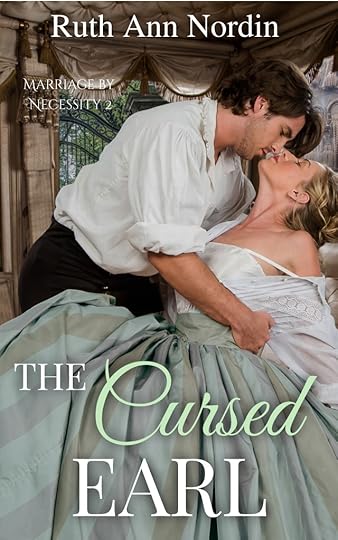
The stuff applies specifically to European concepts of good and bad luck since the hero is in Regency England. I also couldn’t include everything I came across. There is a lot of superstitions out there. The stuff I mention below is what ended up in the book.
Good luck:
If a bird poops on you, it’s transferring its prosperity to you.
You wear a garment inside out for good luck, but it’s only good luck if you keep it on that way all day. If you do it by accident, it’s even better (but still remember to keep it that way all day).
A horseshoe over the entryway is luck if it’s turned the right way up. (If the horseshoe is the wrong way, it brings bad luck.)
If the bride and groom don’t see each other before the wedding, then it’s good luck. This goes back to a time of arranged marriages. The idea was that if the bride and groom saw each other before the ceremony, then they’d get cold feet and bolt for the door.
Wedding bells were considered to bring abundance and prosperity. Ringing the bells in a church was believed to ward off evil spirits.
Throwing birdseed at a wedding is said to bring fertility to the married couple. This tradition actually goes back to the ancient Assyrians and Egyptians. The Romans later used this tradition, too. They didn’t throw birdseed. Usually, they’d throw wheat or rice. Somewhere along the way, a myth came about that when birds ate rice, the rice absorbed all the water inside the birds and caused the birds to explode. Birdseed was encouraged for this reason.
It’s good luck for the husband to carry his wife over the threshold. There are a couple of reasons for this. One is that the groom didn’t want his wife to trip and fall. But in Medieval Europe, it was believed that evil spirits tried to go with the bride into the house. When the groom carried her over the threshold, the evil spirits couldn’t latch onto her shoes. Also, in ancient times, men would abduct women and take them into their homes. Since the women fought them, they had to carry the women over the threshold. (In the book, our hero carries the heroine over the threshold so she doesn’t trip or fall.)
Oddly enough, black cats are good luck in England. Such isn’t the case in the US.
A clover with four leaves is good luck because the four sides stand for faith, hope, luck, and love.
If you carry an acorn with you, it’s said to protect you from illnesses, aches, and pains. If you are sick, it’s said to speed up the recovery process and relieve pain.
A rabbit’s foot is lucky, but it has to be the left hind foot. Rabbits are seen as symbols of fertility and abundance. Now I know why my mom used to use the phrase “multiply like rabbits” when someone had a lot of kids.
Absentmindedly rocking an empty cradle means a baby is on the way.
Planting a leek in the house prevents the house from catching on fire.
Bad luck:
If you come across a funeral procession, it’s both bad luck and hastens death. The only way out of this is to hold onto your button. If you can avoid the procession altogether, that’s even better.
If you don’t hold your breath while passing a graveyard, you could breathe in the spirit of someone who recently died. (As a side note, if you don’t cover your mouth when you yawn, you risk an evil spirit entering you.)
Seeing an owl in the daytime means there will be a death.
Dreaming of a baby being born means someone is going to die. I had a friend in college who believed this.
A horseshoe without nails is considered bad luck. This goes back to Irish folklore involving Saint Dunstan. He was a blacksmith. Legend goes that the devil came to him looking for a horseshoe. Dunstan used iron nails to secure the red-hot horseshoe to one of his hooves, and it caused the devil so much pain, he begged Dunstan to remove it. Dunstan agreed to remove it so long as the devil promised to never enter a place where a horseshoe hangs above the door. The devil agreed and left. So that’s why iron is important in good luck with horseshoes. (As an aside, iron is also said to ward off fairies in Irish folklore. I learned that while writing An Earl In Time.)
Ravens aren’t lucky, per se, but if you see two or three together, things are going to get really bad.
Feathers of a peacock in the home is bad luck. The Evil-Eye on the feather is associated with wickedness.
Green is good luck UNLESS it’s Scheele’s Green. Back in the 1770s, a Sweedish chemist by the name of Carl Scheele created a greenish-yellow color that became known as Scheele’s Green. It was pretty popular in Europe. Unfortunately, this color had copper arsenite in it. This color was used in wallpaper, clothes, candles, and even children’s toys. When these items got damp and were allowed to mold, the arsenic was vaporized and released into the air. This ended up killing people, and many think Napoleon died from it.
August 19, 2021
Had to Move Back Publishing Months on My Books
This has been one heck of a summer. It started in the spring when we found out a family member had terminal cancer. There were visits, of course. The funeral was in July. During this time, I was taking the kids in for eye exams and dental exams to get them ready for school. I enrolled my youngest back into school since he misses being with his friends. Then for the past two weeks, I’ve been sick.
As much as I tried to keep up with The Cursed Earl, I wasn’t able to do it. I’m almost 60,000 words into the book, and usually I would be close to the end, but this story line is longer than what I usually do. I’d rather not rush the ending just so I can have it out in November. I want to make sure I give this story everything it deserves.
I don’t know when I’ll be up to writing again. Because of that, I have decided to push back all of the books in my writing schedule. That way, I don’t stress out over trying to resume my writing schedule before I’m physically up for it. Below is the new plan.
Interview for a Wife (Nebraska Prairie Series: Book 3) will be out September 25
Thankfully, before I got sick, I was able to get this all finished up. This is the last book I’ll be able to publish this year.
The Cursed Earl (Marriage by Necessity Series: Book 2) has been moved to January
At the moment, I have January 9 down for it. I really hope this is the last time I move this book back.
The Loner’s Bride (Wyoming Series: Book 4) has been moved to March
I put this in for March 13.
Suitable for Marriage (Husbands for the Larson Sisters: Book 3) has been moved to May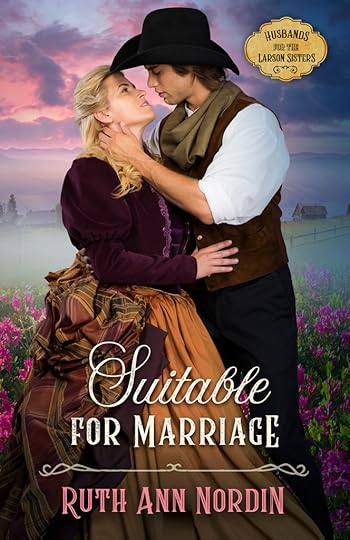
I have this set for May 15.
Heiress of Misfortune (Marriage by Necessity Series: Book 3) has been moved to July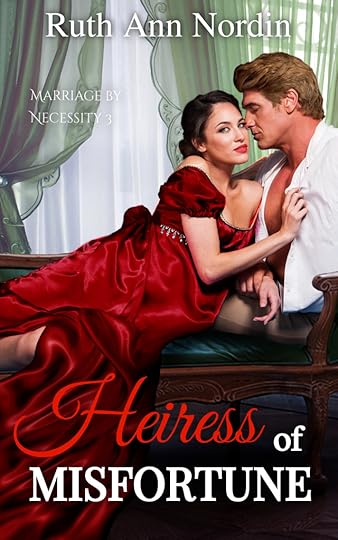
This is now set for July 17.
Secret Admirer (Marriage by Obligation Series: Book 1) will be moved back to September
At the moment, this is set for July, but I’ll move it to September next month. On the Smashwords dashboard, I can’t post a pre-order longer than one year out.
I want to have a historical western out next November.My hope is to write Daisy Larson’s book in this slot, but I haven’t come up with the idea for her story yet. I might have to put something else in this slot.
August 15, 2021
What an Author’s Life is Really Like
I saw an article from a celebrity who was talking about what being a celebrity is really like, and it inspired me to write this post.
1. Most people don’t recognize an author in real life.
No one in my town knows that I write until they ask me what I do for a living and I tell them. They’ve never heard my name. They haven’t seen me on social media. They haven’t seen me on online book retailers even though some are avid romance readers. Authors don’t have to worry about being approached in public to have someone autograph their book. I mean, it would be fun if this happened, but so far it’s never happened to me. And I’ve sat at tables at events where I have my books on display and most people aren’t interested in my autograph then, either. I can even offer a paperback for $5 (which costs me $12.99 to buy) or offer a “buy one get one free” option. For anyone wondering, I did originally set the price at $12.99. I wasn’t looking to make a profit off of those books. I was looking to get more exposure in the local community. It was a total wash. Very few people (even romance readers) show any interest. This is why I no longer waste my time at these events. If you’re not a well-known name like Stephen King or Nora Roberts, most people don’t care about you.
The best place to engage with people is online because those people are more likely to give the average run-of-the-mill author a try. Most authors aren’t household names. Most fall into the land of obscurity. Even authors who make a “six-figure income” are largely unknown since even I had no idea they existed until another person brought them to my attention. It’s just the nature of the business. With the amount of books available, it’s easy to get lost in the crowd. That’s both a good and a bad thing. It’s good because you are given privacy, but it’s bad because it’s harder to find an audience.
2. Most authors aren’t making a “six-figure income”.
This is the myth that annoys me the most because it’s the one touted the most in the author community. Authors have a tendency to act like if you’re not bringing in six figures, your advice isn’t worth listening to. A lot of people out there don’t make six figures at their jobs, but they aren’t shamed the same way authors in the indie author community are. Can you imagine us telling teachers that their views on education is not important because they aren’t making a “six-figure income”? Or would you tell a mechanic he has no right to give you auto advice if he makes anything less than “six figures”? But we do this to authors all the time.
Not everyone needs to make six figures in order to be happy or to make a living. If you don’t have debt, if you can live below your means, and if you are in an inexpensive area, you can easily make it on less than six figures. It’s all about maintaining a modest lifestyle. You do need to mindful of taxes, of course. (I didn’t realize this early on and had to sell a truck to pay my taxes. To this day, I still miss that truck.) An average rule of thumb I go with is about half of your income should be set aside for taxes, but it’s not really that high. You have to talk with a qualified accountant to get an idea of the exact percentage you need to pay. This percentage will change based on new tax policies that are implemented in any given year. But once you factor in your taxes and if you keep your expenses low, you can make it on five figures.
Also, you don’t need to be a New York Times or USA Today bestselling author to “make it”. Is it a nice perk? Sure. Any achievement is nice. I’m just saying that hitting a bestselling list isn’t a requirement to make a living with your writing. I’ve never made either list, and I’ve been making a living writing since 2012. There were a couple of people who said that they would never buy my books unless I did hit one of those lists, but fortunately, most people don’t think this way. So if you’re afraid you need to hit the list in order to be seen as a “real” author, don’t be. Writing a book people want to read is the most important thing you can do.
3. Authors aren’t always as confident in their books as they appear to be.
Around 2008, traditionally published authors in my romance group said, “You’re only as good as your next book.” In other words, all it takes is for one bad book to ruin the enthusiasm people have for your work. I think most people will forgive one dud, but if you continue to write “meh” books, you’re going to end up losing readers.
This is why every book comes with a great deal of pressure. It’s also why I end up thinking of the market even though I strive to write for passion. With every book I write, I end up asking myself, “How will people perceive this scene? Will people like this character? Should I go back and change something? Maybe I should go in an alternate direction with this story.” It’s hard to stick with passion. Like really hard.
Every author wants everyone who reads their book to enjoy it. We know it’s not a realistic expectation, but there’s a part of us that still tries. When the book is published, there’s often that sense of dread that says this is going to be the book that completely tanks the writing career. This is why reviews can hit us so hard when they point out a book’s flaws. The only way I can think of to combat this is to keep reviews and emails on hand from people who said positive things about our books. Go to those as often as you need to.
4. Most of the conflict an author will encounter comes from the writing community.
When I got started with publishing my books, I had this naive belief that all authors would support each other. I thought that our love of writing would trump everything else. I thought the biggest obstacle would be readers not liking our books. I expected the negative emails and negative reviews. I figured that was par for the course. What I didn’t realize was how much negativity would come from other authors. My biggest critics are writers. My biggest supporters are readers. Writers read to find errors. Readers read to enjoy the book. Every time a writer says they’re going to read one of my books, I want to run and hide.
Probably the biggest source of conflict, however, comes from writing groups. I love being in writing groups because I learn about the publishing world and get marketing ideas from them. So the writing community can be resourceful. But some of the groups are hotbeds for arguments. The problem comes in when you decide to engage in debates within the author community. Stuff like writing to market vs writing for passion or KU vs wide can spark an argument that will go on for days. Some writers end up resorting to putting down others they don’t agree with. There are also smaller things that can cause surprising arguments, like “white or cream” paper for one’s paperback or uploading books to individual retailers vs letting a distributor like Smashwords or D2D take care of that for you. Then there’s the hypocrisy I’ve noticed. For example, if a relatively unknown author in the indie community does something wrong, it gets blasted all over the place, and that author is heavily criticized. However, if a well-known author in that community does the exact same thing, most authors will run to defend the action. So the authors making the most money can get away with anything simply because they’re “more important” in the community.
My advice is to tread lightly when arguments pop up. Some writing groups I once enjoyed descended into an atmosphere of toxicity. I had to end up leaving them. There’s enough negativity already going on in the world. I don’t need to taint my enjoyment of writing along with everything else. That’s why I ignore the drama unless it’s something that poses a threat to the future of indie publishing, such as if an author tries to trademark a commonly used word or if an author is stealing other people’s work. Stuff like that should be addressed in order to keep things fair for all authors. But getting caught in things that ultimately don’t matter aren’t worth it. Sometimes it’s best to let things pass through.
5. An author’s family and friends are not always their biggest fans.
For the most part, my family and friends never read my books. I had a father-in-law and uncle-in-law who read some of my books, but they’re dead now. My family and real life friends have no interest in romance. Now, I did acquire some real life friends who like my books, but I met them after they became interested in my books.
So this idea that an author’s family and friends are buying their books, leaving lots of glowing reviews about those books on Amazon, and are sneaking into reader groups to promote those books isn’t true. I see this myth getting circulated quite a bit. I have yet to come across an author whose family and friends are their most ardent supporters. The authors I know are in the same position I’m in.
The truth is, we have to slowly develop a readership. We can run ads, but we have no idea who sees the ads or who buys our books because of them. We can set up websites, blogs, and social media accounts to develop on online presence, but we have no way of knowing who is seeing any of it. Ultimately, the best form of marketing is word-of-mouth by people who love our books, and that’s something we have no control over. We depend on the kindness of strangers.
6. To get books out on a consistent basis, authors have to write even when they don’t feel like it.
This idea that authors get to wait around for their muse to inspire them before they write is a myth. This is a challenging job. It’s not easy to put words down when your mind just isn’t in it that day. I don’t put out as many books as some, but I do have a routine that I adhere to as much as possible. This isn’t easy when unexpected things pop up or when a spouse/kid wants your attention. A lot of people seem to think that when you’re at the computer, you’re just playing around. Unfortunately, for every interruption I get, it takes 5-15 minutes to get back into the story I’m working on, and no matter how many times I explain this to my family, they don’t care.
The biggest challenge in an author’s life is getting the book done. I’m in the mood to write about 50% of the time. On the other days, I trudge through it. Usually, when I get past the first 500 words, things get easier, but there are those days when every single sentence is like pulling teeth. There are days when I want to walk away and never write again. To better your chances of making a living with your writing income, you have to be consistent. I aim to get a book out every other month. I’ve seen too many authors take a year off only to realize they can’t pick up where they left off. They were once making a living, but they don’t anymore. There seems to be something that happens in extended breaks that ruins their career. Maybe readers got impatient and stopped following them. Maybe retailers shifted algorithms in a way that made them a lot harder to discover. I know a new book gets more attention at a retailer than an old book does. There are authors who get one book out a year and manage fine, but they’re doing other things to bring money in, such as offering courses, making You Tube videos, or running a lot of ads. They have other venues of making money. For authors like me, who don’t have other venues, the next book is extremely important, and you can’t go too long between book releases.
That’s why I have learned strategies to write while feeling exhausted, to push through times when the story isn’t coming easily, and to finish my current book when I’m itching to start the next. I think people assume writers are always typing away with a lot of enthusiasm, but the truth is, we’re often fighting the urge to hop online to do something else. Discipline is key. The routine is not easy to stick with. But it’s like exercise. You don’t get in shape by waiting to feel like working out. You get in shape because you work out even when you’d rather stay in bed. Routine is extremely important.
****
That’s all I can think of for what an author’s life is really like. Are there any authors out there that have something to add that I missed?



